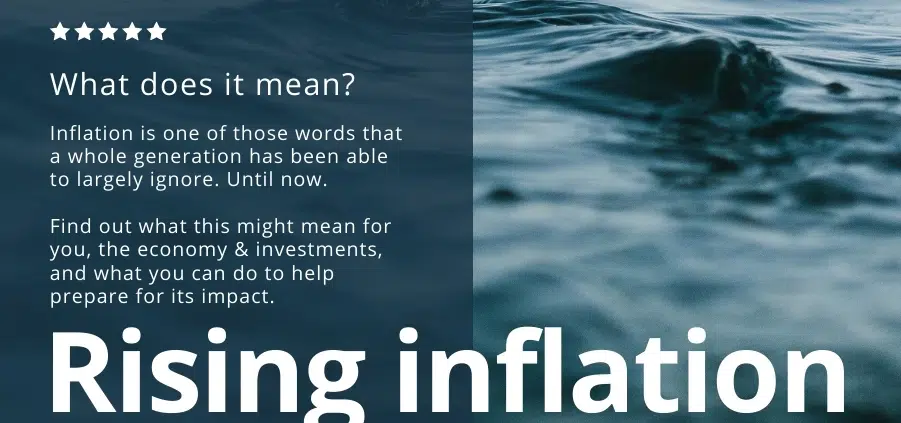What rising inflation means for you
Table of Contents
ToggleWhat rising inflation means for you
The word “inflation” has been largely ignored by a whole generation until now.
Inflation in the US is currently at 8.5%, while in Europe it is at 7.5%. The Reserve Bank of Australia predicts that our underlying inflation will rise to around 6% in the second half of 2022. But what is inflation and how does it impact you?
The International Monetary Fund states that inflation is a measure of the increase in the price of a set of goods and services over a specified period, usually a year. In simpler terms, it indicates a rise in the cost of goods and services, meaning you need to pay more for each purchase you make.
How does an increase in overseas inflation affect Australia's inflation rate?
It is no surprise that countries in today’s world are highly interconnected. Therefore, an increase in overseas inflation rates will also affect the Australian economy, particularly regarding the cost of imports.
The impact of a rise in labour costs in the US may differ in degree and timing. For instance, the impact on Australians may be limited, but an increase in the price of iPhones or Nike shoes in the US will likely result in a similar price increase in Australia
The markets no longer view inflation as a temporary issue due to higher wage growth and increased supply pressures. Many countries have experienced higher inflation in the past year, leading central banks to reverse their policies and governments to reduce spending.

How will rising interest rates and inflation affect Australia's economy?
Central banks around the world, including the RBA, closely monitor interest rate changes made by the US Federal Reserve (the Fed). In recent years, both the US and Australia have lowered interest rates in an effort to stimulate their respective economies.
As interest rates are near all-time lows and economic performance is strong, it is expected that rates will rise. Typically, when the Federal Reserve raises its interest rates, Australia follows suit. As a result, the cost of borrowing money will increase, leading to higher inflation and making goods and services more expensive.
When inflation rates increase, the value of the Australian dollar may decrease, leading to individuals having less purchasing power. This can make it difficult for people to save money, especially if their income does not keep pace with inflation.
How will investors be affected?
The recent trend of disinflation has created a positive environment for investments in risk assets. However, an increase in interest rates and borrowing costs could significantly impact share prices and cause fluctuations in their value. Additionally, future returns may decrease as higher interest rates often result in a lower valuation of shares.
When interest rates increase, parents who invest face higher home loan interest payments, which lowers their disposable income and ability to invest. Volatility in share prices can slow their progress in building wealth.
Retirees, who have less spending power and are more vulnerable to a sequencing risk event, would be particularly sensitive to rising inflation. For them, an increase in the cost of goods and services coupled with share market volatility could lead to having to sell more of their investment assets, potentially at a loss or reduced profit. Additionally, there may be uncertainty in dividend income, which many retirees often rely on. With fewer years to recover from a drop in portfolio value, retiree investors are at a disadvantage compared to younger investors.

What steps can you take to prepare for an increase in inflation?
- To make sure you’re on track financially, it’s crucial to analyse your personal cash flow situation to see where your money goes.
- If you have a variable rate home loan that you haven’t reviewed in a while, you may want to consider switching to a fixed rate to protect yourself from potential increases in interest rates. Keep in mind that the market has already started to take potential rate hikes into account.
- It may also be a good idea to reconsider taking out new personal loans, such as car loans, as interest rates are likely to rise.
- For investors, it can be tempting to invest more money in stocks when prices are falling, but it’s always a good idea to average your position to reduce market timing risk.
- Consider having exposure to well-established “blue chip” companies rather than riskier stocks for a more stable investment. These types of companies are known for having strong balance sheets, which can provide peace of mind for investors.

How we can help beat inflation
If the thought of inflation concerns you, consulting with a professional adviser can help ease your worries. Your adviser will evaluate your financial situation and ability to fulfil your financial obligations, and provide strategies to combat inflation.
Advisers have a strong investment philosophy and use a decision-making framework that allows them to quickly adjust portfolios in response to inflation while also considering your individual needs and goals.









